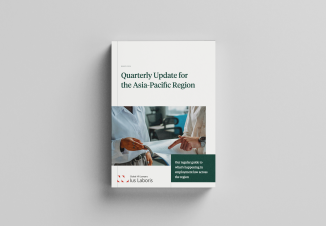
Korean law provides for up to one year of unpaid childcare leave for a parent with a child aged eight or younger, or in the second grade or below. Although the leave is unpaid, there are government subsidies available for many employees on childcare leave, which are based on the employee’s wage level (subject to a floor and cap). Subsidies may be lost or reduced to the extent that the sum of monthly subsidies plus any compensation received exceed an employee’s ‘ordinary wage’.
There were already rules providing for enhanced subsidies for each month that both parents take childcare leave (together or at different times) starting in the first year of the child’s life, up to a maximum of three months. This policy exists to encourage fathers to also take leave to raise young children, rather than the common practice whereby only mothers make use of statutory childcare leave.
However, a recent change in the relevant regulations has broadened access to these subsidies as follows:
Korean equal opportunity legislation requires that employers endeavour to take any of the following measures in order to support the childcare needs of an employee with children aged eight or younger or in the second grade or lower:
Although this is worded as an obligation to try to take such measures, the Supreme Court recently held that this obligation is meaningful and enforceable.
The case involved an employee who had two young children. She was employed by a service provider and worked for a certain service-recipient company. After the service-recipient company switched to a different service provider, the employee became an employee of the new service provider. However, although the previous service provider had refrained from assigning her to difficult work hours (e.g. holidays and early morning hours) to accommodate her childcare obligations, the new employer refused her request not to work at difficult hours and she was eventually dismissed for failure to follow work instructions.
The Supreme Court held that the employer had lacked a just cause to dismiss the employee, because she was justified in refusing the unfair work instructions that failed to reasonably take account of her parenting needs and the employer’s obligations under equal opportunity law. This is the first Supreme Court decision treating these obligations as affirmative employee rights.
It is worth noting that the Supreme Court case involved an employee who transferred from one employer to another, occupying essentially the same role with only the employer’s identity changing. It is therefore unclear how applicable the reasoning may be to cases where an employee simply accepts a new role at a new employer and then requests special accommodations.
Nonetheless, employers should be aware that they cannot simply dismiss an employee’s request to accommodate childcare needs without considering the circumstances.


